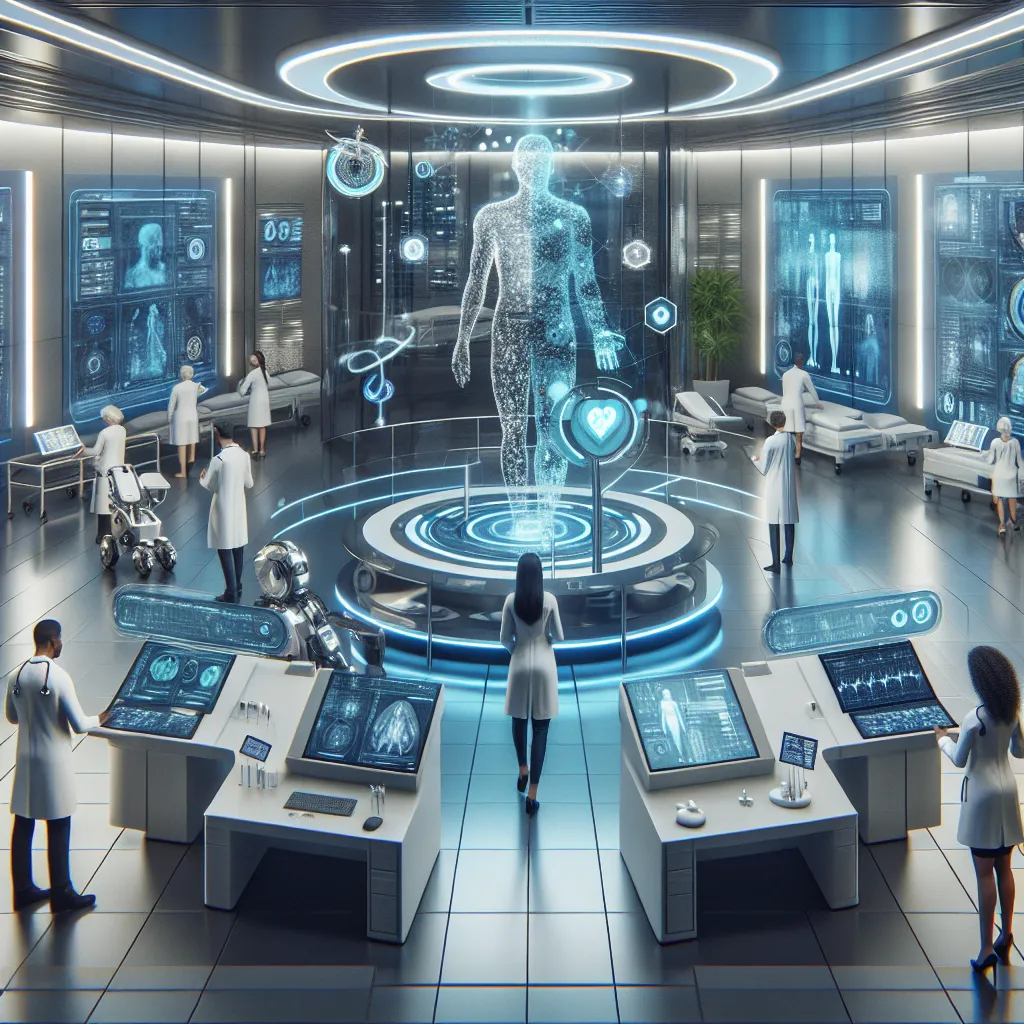Welcome to our IELTS Reading practice session focused on the fascinating topic of “How AI is Revolutionizing Healthcare Management.” As an experienced IELTS instructor, I’m excited to share this comprehensive practice test with you, designed to enhance your reading skills and prepare you for the IELTS exam.
Nội dung bài viết
- Introduction to the IELTS Reading Test
- Practice Test: AI in Healthcare Management
- Passage 1 – Easy Text
- The Dawn of AI in Healthcare
- Questions 1-5
- Questions 6-10
- Passage 2 – Medium Text
- AI’s Role in Transforming Clinical Decision Support
- Questions 11-15
- Questions 16-20
- Passage 3 – Hard Text
- The Ethical Implications and Future Prospects of AI in Healthcare Management
- Questions 21-26
- Questions 27-33
- Questions 34-40
- Answer Key
- Passage 1
- Passage 2
- Passage 3
- Conclusion
 AI revolutionizing healthcare management
AI revolutionizing healthcare management
Introduction to the IELTS Reading Test
Before we dive into the practice test, let’s briefly review the structure of the IELTS Reading test. It consists of three passages of increasing difficulty, with a total of 40 questions to be answered in 60 minutes. Today’s practice will mirror this format, focusing on how artificial intelligence is transforming healthcare management.
Practice Test: AI in Healthcare Management
Passage 1 – Easy Text
The Dawn of AI in Healthcare
Artificial Intelligence (AI) is rapidly transforming the landscape of healthcare management, ushering in a new era of efficiency, accuracy, and personalized care. From streamlining administrative tasks to enhancing diagnostic procedures, AI is revolutionizing how healthcare providers operate and deliver services to patients.
One of the most significant impacts of AI in healthcare management is in the realm of data analysis. Healthcare institutions generate vast amounts of data daily, including patient records, treatment outcomes, and research findings. AI algorithms can process this information at unprecedented speeds, identifying patterns and insights that might elude human analysts. This capability enables healthcare managers to make data-driven decisions more quickly and accurately, leading to improved patient outcomes and resource allocation.
Moreover, AI is proving invaluable in predictive analytics. By analyzing historical data and current trends, AI systems can forecast patient admissions, helping hospitals prepare for fluctuations in demand. This predictive power extends to individual patient care as well. AI models can assess a patient’s medical history and current condition to predict potential complications or readmission risks, allowing for proactive interventions.
In the realm of patient care management, AI-powered chatbots and virtual assistants are revolutionizing how patients interact with healthcare systems. These intelligent systems can handle appointment scheduling, answer common medical questions, and even conduct initial symptom assessments. This not only improves patient engagement but also frees up healthcare professionals to focus on more complex tasks.
The integration of AI in healthcare management also promises to address one of the industry’s most pressing challenges: burnout among healthcare professionals. By automating routine tasks and providing decision support tools, AI can alleviate the administrative burden on doctors and nurses, allowing them to dedicate more time to patient care.
As we stand on the brink of this AI-driven revolution in healthcare management, it’s clear that the potential benefits are immense. However, it’s equally important to navigate the ethical considerations and potential challenges that come with implementing these powerful technologies in such a critical sector.
Questions 1-5
Do the following statements agree with the information given in the passage?
Write
TRUE if the statement agrees with the information
FALSE if the statement contradicts the information
NOT GIVEN if there is no information on this
- AI can process healthcare data faster than human analysts.
- Predictive analytics powered by AI can forecast patient admissions.
- AI-powered chatbots can perform complex medical procedures.
- The use of AI in healthcare management can help reduce burnout among healthcare professionals.
- All healthcare institutions have fully integrated AI into their management systems.
Questions 6-10
Complete the sentences below.
Choose NO MORE THAN TWO WORDS from the passage for each answer.
- AI algorithms can identify patterns and insights in healthcare data that might be missed by ____.
- AI enables healthcare managers to make ____ ____ more quickly and accurately.
- AI models can assess a patient’s medical history to predict potential ____ or readmission risks.
- AI-powered chatbots and virtual assistants can conduct initial ____ ____.
- The integration of AI in healthcare management promises to address the challenge of ____ among healthcare professionals.
Passage 2 – Medium Text
AI’s Role in Transforming Clinical Decision Support
The integration of Artificial Intelligence (AI) into clinical decision support systems represents a paradigm shift in healthcare management. These advanced systems are designed to assist healthcare professionals in making informed decisions about patient care, diagnosis, and treatment plans. By leveraging machine learning algorithms and vast databases of medical knowledge, AI-powered clinical decision support tools are enhancing the accuracy and efficiency of medical practice.
One of the most promising applications of AI in clinical decision support is in the field of diagnostic imaging. AI algorithms trained on large datasets of medical images can detect subtle abnormalities that might be overlooked by even experienced radiologists. For instance, in the realm of oncology, AI systems have demonstrated remarkable accuracy in identifying early-stage cancers in mammograms and lung CT scans. This capability not only improves early detection rates but also helps prioritize cases that require immediate attention, potentially saving lives through timely interventions.
Moreover, AI is revolutionizing the way healthcare providers approach personalized medicine. By analyzing a patient’s genetic profile, medical history, lifestyle factors, and even social determinants of health, AI systems can generate tailored treatment recommendations. This level of personalization goes beyond what is typically possible in traditional clinical settings, where time constraints often limit the depth of analysis for each patient. AI-driven personalized medicine promises to improve treatment efficacy while minimizing adverse effects by matching patients with the most suitable therapeutic options.
In the realm of pharmacological research and drug discovery, AI is accelerating the process of identifying potential new treatments. Machine learning models can analyze vast libraries of chemical compounds, predicting their efficacy and potential side effects with a speed and accuracy that surpasses traditional methods. This not only reduces the time and cost associated with drug development but also increases the likelihood of discovering novel treatments for challenging medical conditions.
AI is also playing a crucial role in enhancing patient safety through continuous monitoring and early warning systems. In hospital settings, AI algorithms can analyze real-time patient data from various sources, including electronic health records, wearable devices, and bedside monitors. These systems can detect subtle changes in a patient’s condition that might indicate a deterioration, alerting healthcare professionals before a critical situation develops. This proactive approach to patient monitoring has the potential to significantly reduce adverse events and improve overall patient outcomes.
Despite these advancements, the integration of AI into clinical decision support is not without challenges. Issues of data privacy, algorithm transparency, and the potential for bias in AI systems remain significant concerns. Healthcare providers and policymakers must navigate these challenges carefully to ensure that AI technologies are deployed ethically and equitably.
As we continue to witness the transformative impact of AI on clinical decision support, it’s clear that this technology has the potential to significantly enhance the quality and efficiency of healthcare delivery. However, it’s crucial to remember that AI is a tool designed to augment, not replace, the expertise of healthcare professionals. The future of healthcare lies in the synergistic relationship between human insight and artificial intelligence, working together to provide the best possible care for patients.
Questions 11-15
Choose the correct letter, A, B, C, or D.
-
According to the passage, AI-powered clinical decision support systems are primarily designed to:
A) Replace healthcare professionals
B) Assist in making informed decisions about patient care
C) Reduce healthcare costs
D) Improve hospital administration -
In diagnostic imaging, AI algorithms have shown particular promise in:
A) Performing surgeries
B) Administering medications
C) Detecting subtle abnormalities
D) Replacing radiologists entirely -
AI-driven personalized medicine aims to:
A) Increase medication dosages
B) Eliminate the need for doctors
C) Improve treatment efficacy while minimizing adverse effects
D) Standardize all treatment plans -
In pharmacological research, AI is helping to:
A) Replace human researchers
B) Slow down the drug discovery process
C) Increase the cost of drug development
D) Accelerate the identification of potential new treatments -
The passage suggests that the future of healthcare lies in:
A) Completely replacing human doctors with AI
B) Abandoning traditional medical practices
C) A synergistic relationship between human insight and AI
D) Relying solely on AI for all medical decisions
Questions 16-20
Complete the summary below.
Choose NO MORE THAN TWO WORDS from the passage for each answer.
AI is transforming clinical decision support in healthcare management by enhancing the accuracy and efficiency of medical practice. In diagnostic imaging, AI can detect 16____ that might be missed by radiologists, particularly in fields like oncology. AI also enables 17____ ____ by analyzing various patient factors to generate tailored treatment recommendations. In drug discovery, AI is accelerating the process of identifying new treatments by analyzing 18____ ____ with unprecedented speed. AI-powered 19____ ____ systems in hospitals can detect subtle changes in a patient’s condition, potentially reducing adverse events. Despite these advancements, challenges remain, including concerns about 20____ and algorithm transparency.
Passage 3 – Hard Text
The Ethical Implications and Future Prospects of AI in Healthcare Management
The integration of Artificial Intelligence (AI) into healthcare management systems represents a double-edged sword, offering unprecedented opportunities for improving patient care while simultaneously raising complex ethical dilemmas. As AI systems become increasingly sophisticated and ubiquitous in healthcare settings, it is imperative to critically examine the ethical implications of this technological revolution and consider its future trajectory.
One of the primary ethical concerns surrounding AI in healthcare management is the issue of data privacy and security. The efficacy of AI systems is largely dependent on access to vast amounts of patient data, including sensitive personal and medical information. While this data is crucial for training algorithms and generating accurate insights, it also poses significant risks if not properly protected. The potential for data breaches or unauthorized access to AI systems could have far-reaching consequences, compromising patient confidentiality and eroding trust in healthcare institutions. Moreover, the use of AI in healthcare raises questions about informed consent and patient autonomy. As AI systems become more involved in decision-making processes, there is a need to ensure that patients are fully aware of how their data is being used and have the ability to opt-out of AI-driven care if they so choose.
Another critical ethical consideration is the potential for bias and discrimination in AI algorithms. Machine learning models are only as unbiased as the data they are trained on, and historical healthcare data often reflects societal inequalities and systemic biases. If not carefully designed and monitored, AI systems could perpetuate or even exacerbate existing healthcare disparities, disproportionately affecting marginalized communities. For instance, an AI system trained predominantly on data from one demographic group may produce less accurate results for individuals from other groups, leading to misdiagnoses or suboptimal treatment recommendations. Addressing this issue requires a concerted effort to ensure diverse and representative datasets, as well as ongoing monitoring and adjustment of AI algorithms to detect and mitigate biases.
The accountability and transparency of AI systems in healthcare management also present significant ethical challenges. As AI becomes more involved in critical healthcare decisions, questions arise about who is ultimately responsible when errors occur. The “black box” nature of some advanced AI algorithms, particularly deep learning models, can make it difficult to understand and explain how certain decisions are reached. This lack of transparency not only complicates issues of liability but also raises concerns about the ability of healthcare professionals and patients to trust and verify AI-generated recommendations. Developing explainable AI models and establishing clear guidelines for AI accountability in healthcare settings are crucial steps in addressing these concerns.
Looking to the future, the potential applications of AI in healthcare management are vast and rapidly evolving. Predictive analytics powered by AI could revolutionize preventive care, identifying at-risk individuals and recommending interventions before health issues become critical. AI-driven precision medicine promises to tailor treatments to individual genetic profiles, potentially improving efficacy and reducing adverse effects. In the realm of healthcare administration, AI systems could optimize resource allocation, streamline supply chains, and enhance overall operational efficiency.
However, realizing these potential benefits while navigating the ethical landscape will require a multidisciplinary approach. Collaboration between healthcare professionals, AI researchers, ethicists, policymakers, and patient advocates is essential to develop frameworks that balance innovation with ethical considerations. This may involve establishing new regulatory guidelines, implementing robust oversight mechanisms, and fostering a culture of ethical AI development within the healthcare industry.
Moreover, as AI systems become more advanced, there is a need to consider the long-term implications for the healthcare workforce. While AI has the potential to augment and enhance the capabilities of healthcare professionals, there are concerns about job displacement and the changing nature of medical practice. Ensuring that healthcare workers are adequately prepared for an AI-driven future through education and reskilling initiatives will be crucial.
In conclusion, the integration of AI into healthcare management systems presents both immense opportunities and significant ethical challenges. As we navigate this technological revolution, it is imperative to approach AI implementation in healthcare with careful consideration of its ethical implications. By fostering transparency, addressing biases, ensuring data privacy, and maintaining human oversight, we can harness the power of AI to improve healthcare outcomes while upholding the fundamental principles of medical ethics. The future of AI in healthcare management lies not in replacing human judgment but in creating a symbiotic relationship between artificial intelligence and human expertise, working in concert to provide more effective, equitable, and compassionate care for all patients.
Questions 21-26
Choose the correct letter, A, B, C, or D.
-
According to the passage, the integration of AI into healthcare management is described as a:
A) Necessary evil
B) Double-edged sword
C) Guaranteed success
D) Temporary trend -
One of the primary ethical concerns surrounding AI in healthcare management is:
A) The cost of implementation
B) The speed of data processing
C) Data privacy and security
D) The complexity of AI algorithms -
The potential for bias in AI algorithms is attributed to:
A) Intentional programming by developers
B) The inherent nature of artificial intelligence
C) Historical healthcare data reflecting societal inequalities
D) Patients’ reluctance to share personal information -
The “black box” nature of some advanced AI algorithms refers to:
A) Their physical appearance
B) The difficulty in understanding how decisions are reached
C) The color of the computers used
D) The secure storage of patient data -
The passage suggests that the future of AI in healthcare management will require:
A) Complete replacement of human healthcare workers
B) Exclusive focus on administrative tasks
C) A multidisciplinary approach involving various stakeholders
D) Limiting AI to research purposes only -
The long-term implication of AI in healthcare for the workforce includes:
A) Guaranteed job security for all healthcare professionals
B) Complete automation of all medical procedures
C) Potential job displacement and changing nature of medical practice
D) Elimination of the need for medical education
Questions 27-33
Complete the summary below.
Choose NO MORE THAN THREE WORDS from the passage for each answer.
The integration of AI in healthcare management presents both opportunities and ethical challenges. One major concern is 27____ ____ ____, as AI systems require access to sensitive patient information. This raises questions about 28____ ____ and patient autonomy. Another issue is the potential for 29____ ____ ____ in AI algorithms, which could perpetuate healthcare disparities. The 30____ ____ of some AI models complicates issues of accountability and trust. Future applications of AI in healthcare include 31____ ____ for preventive care and AI-driven 32____ ____ for tailored treatments. Realizing these benefits while addressing ethical concerns will require a 33____ ____, involving collaboration between various stakeholders in the healthcare industry.
Questions 34-40
Do the following statements agree with the claims of the writer in the passage?
Write
YES if the statement agrees with the claims of the writer
NO if the statement contradicts the claims of the writer
NOT GIVEN if it is impossible to say what the writer thinks about this
- AI systems in healthcare management are entirely risk-free and beneficial.
- Historical healthcare data used to train AI algorithms may reflect societal inequalities.
- Explainable AI models could help address concerns about transparency in healthcare decision-making.
- AI will completely replace human healthcare professionals in the future.
- Collaboration between various stakeholders is necessary to develop ethical frameworks for AI in healthcare.
- All patients are currently fully aware of how their data is being used in AI-driven healthcare systems.
- The future of AI in healthcare lies in creating a symbiotic relationship between artificial intelligence and human expertise.
Answer Key
Passage 1
- TRUE
- TRUE
- FALSE
- TRUE
- NOT GIVEN
- human analysts
- data-driven decisions
- complications
- symptom assessments
- burnout
Passage 2
- B
- C
- C
- D
- C
- subtle abnormalities
- personalized medicine
- chemical compounds
- early warning
- data privacy
Passage 3
- B
- C
- C
- B
- C
- C
- data privacy and security
- informed consent
- bias and discrimination
- black box nature
- predictive analytics
- precision medicine
- multidisciplinary approach
- NO
- YES
- YES
- NO
- YES
- NOT GIVEN
- YES
Conclusion
This practice test on “How AI is Revolutionizing Healthcare Management” provides a comprehensive overview of the topic while challenging your reading comprehension skills. Remember to practice time management


